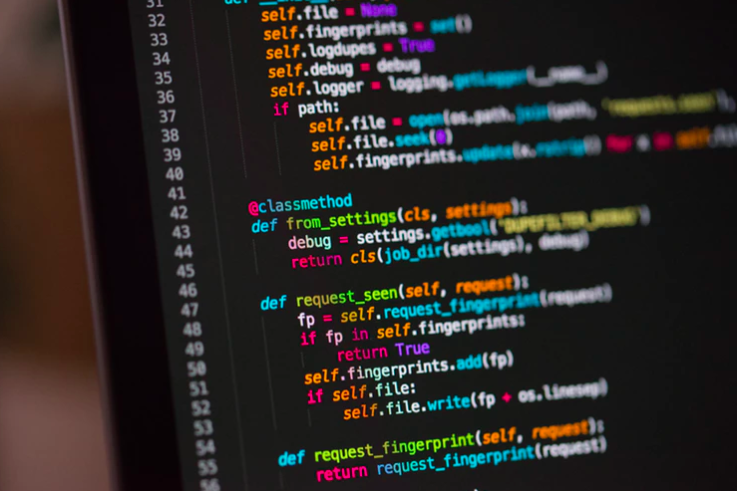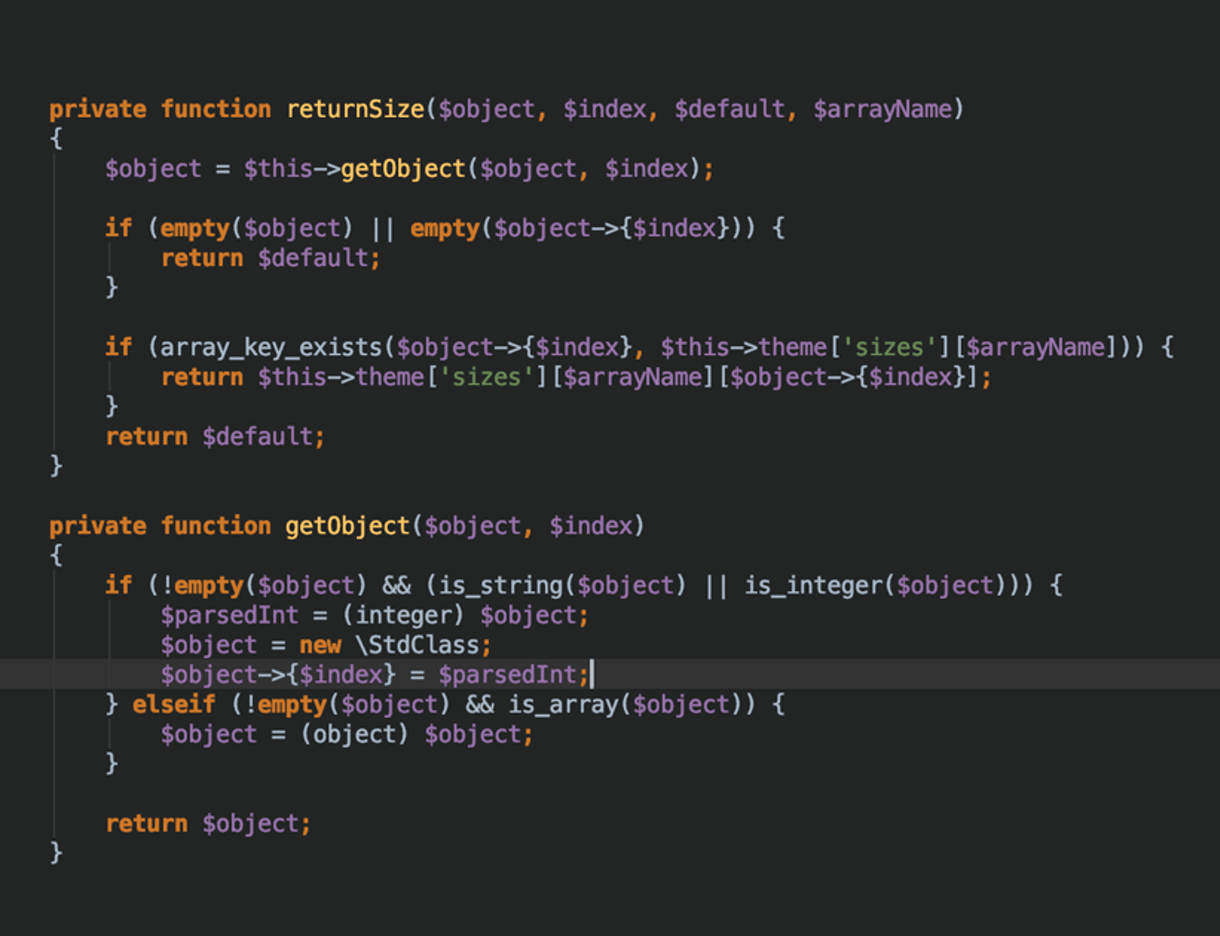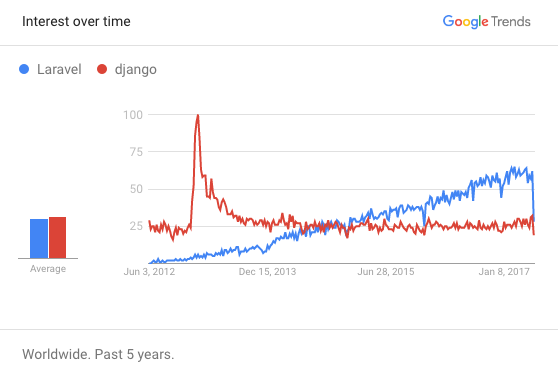Django vs Laravel: Unveiling the Best Framework for Your Project
Using frameworks is a very sensible approach for developing rich and highly interactive web applications, software, or web services. Since a framework is the base of your application, it is important to choose the right framework. With too many frameworks available in the market, it can be a bit of a struggle to select the best one to build a reliable, intuitive, scalable web app. Here, we will discuss and compare two of the leading web development frameworks that are used today, Django vs Laravel. We will dig deep into both frameworks to see what they have to offer and which one of them will fit your business model. But first, let’s understand what a web development framework is and what its types are.

Web Development Framework and Its Types – A Brief Overview
Since web development is a complex process, web development frameworks make the process much easier and save a lot of time for developers. A framework comprises of templates to present information to users in a web browser, an ideal web development environment, Application Programming Interface (APIs), and other services and essentials to develop robust content management systems. Development frameworks are categorized as
Front-end framework
As the name suggests, the frontend is everything that is visible to users. Frontend frameworks are packages containing ready-to-use codes that are categorized in separate folders. Frontend frameworks serve as a solid base for you to build your web applications with seamless flexibility.
A frontend framework comprises of:
- Grids organizing web design elements
- Website components that are pre-designed such as side panels, buttons, navigation bars, etc
- Pre-defined font styles and sizes
Back-end framework
Also known as server-side programming, the backend refers to web aspects that work under-the-hood. Backend frameworks handle the implementation of server-side logics such as data storage, data retrieval, data management and processing, response management, and more.
Now that you’ve got some basic idea of what development frameworks are, let’s dig deeper to understand Django VS Laravel frameworks, their pros and cons, and ultimately, which one is better.
Want to Speak to Our Professionals About Your Project?
Django VS Laravel Framework – Overview
Django Framework
Django is a Python-based open-source framework that is used to develop complex websites and web applications. The framework follows Model-View-Whatever (MVW) Model-View-Template (MVT) architectural patterns and is known for its lightweight out-of-the-box features and independent modules for development and testing purposes.
Launched in 2005 by Django Software Foundation, this framework is used by some of the prominent companies like Bitbucket, Pinterest, Mozilla, Instagram, and more. Django was licensed by a 3-clause BSD (Berkeley Software Distribution) license. The main purpose of the Django framework is to make the development of sophisticated websites and apps simpler and save time. This is what makes Django startup-friendly and the reason why Django web development companies are highly in demand among startups.


Laravel Framework
Developed by Tayler Otwell, Laravel was launched the year 2011. Over a decade, the framework has emerged as one of the most popular web development frameworks amongst development communities. Laravel follows a Model-View-Control architecture pattern and is used for developing content management systems. Moreover, its built-in features make the job of a web developer much easier and simplify the complex task of developing an app from the ground up, helping companies to deliver fast Laravel development services.
Django vs Laravel Framework – Pros and Cons
Django
| Pros | Cons |
|---|---|
| Fast prototyping and development | Can be problematic for building smaller applications |
| Almost no learning curve | Routing in Django is difficult as you need to be familiar with regular expressions |
| Precise language helps in patching security issues | Template errors fail silently (no error message to alert you) |
| Ideal for heavy-traffic websites or apps because of its scalability features. | Weak templating |
| Offer mobile integration | The whole server will restart due to auto-reload |
| Some of the best documentations are available | |
| Rich software with tons of plugins | |
| Open source | |
| Strong community support | |
| Simple data management | |
| Great customization |
Laravel
| Pros | Cons |
|---|---|
| Robust template system through Blade | Beginners can have serious security holes as the syntax is pretty hard for them to understand |
| Routing is simple and intuitive. | Has steeper learning curve compared to Python |
| Dynamic and intuitive language | Little mobile support |
| Maintenance is easier with changing web trends | No support for shared hosting |
| IOC support and built-in CI | Does excessive query on databases which consumes time. |
| Provides Artisan CLI to develop command-line applications | |
| Access to latest PHP features in Interfaces, Namespaces, Anonymous functions, Overloading, Smooth ORM Composer, bundles, REST, templating, etc. | |
| Fast development | |
| Clean MVP architecture | |
| Growing community |
Django VS Laravel Development – Key Differences
You are probably wondering should you invest in Django development services or Laravel development services. But before answering this question, let’s compare the Django VS Laravel framework.
| Point of Difference | Django | Laravel |
|---|---|---|
| Type of technology | Uses MVT and MVW architectural pattern /td> | Uses MVC architectural pattern |
| Tools | It has many third-party libraries, various decorators, and SEO attributes | Offers only a simple set of tools |
| Development Time | Pretty fast | Much slower |
| Language | Development of a Full-Stack web application system in Python | Development of a Full-Stack web application system in PHP |
| Maintained by | It is kept up by Django Software Foundation | It is being kept up by the engineer itself and their community beneath MIT permit |
| Learning Curve | Quite easy to learn, especially if the developer is familiar with Python syntax. So, it takes a little time to understand the code | Has a steep learning curve that takes more time to understand the code |
| Routing | Could be difficult as you need to create API by yourself | Quite simple, as it provides an easy and effective way to create an API |
Django VS Laravel Development Services – Popularity

Django
Undeniably, Django is one of the most popular frameworks. Currently, there are 81,837 websites that are built on the Django framework.
Laravel
Laravel framework is the leader when it comes it popularity having 130,541 websites built on it.
Winner – Laravel

Django
Django is a leading web framework in the U.S., France, Spain, Russia, and 30 other countries.
Laravel
Laravel has a leading usage in Brazil, China, the UK, and 157 other countries
Winner – Laravel

Django
Although Django continues to grow, the framework is still behind Laravel in all market share segments. Django covers 0.65% of market share in Top 10K Sites, 0.721% of market share in Top 100K Sites, 0.529% of market share in Top 1M Sites, and 0.117% of market share in The Entire Web.
Laravel
Laravel is leading in Top 10,000 Websites with 0.84% of market share, Top 100,000 Websites with 1.123% of market share, Top 1,000,000 Websites with 0.954% of market share and The Entire Web with 0.186% of market share.
Winner – Laravel

Django
Django is leading in website categories of Computer & Electronics, Science & Education, Food & Drink, Jobs & Career, Hobbies & Leisure, and one other category.
Laravel
When comparing Django VS Laravel in terms of usage, Laravel has better usage coverage in more websites categories than Django. It is used in website categories that include Computers Electronics & Technology, Internet & Telecommunications, Arts & Entertainment, Finance, Business & Consumer Services, Shopping, Travel, and 13 more categories.
Winner – Laravel
Django VS Laravel – Website Category-wise Comparison
| Website Category | Django (No. of Websites) | Laravel (No. of Websites) |
|---|---|---|
| Computer Electronics & Technology | 5,161 | 7,570 |
| Arts & Entertainment | 2,460 | 3,295 |
| Finance | 1,570 | 2,668 |
| Business & Consumer Services | 1,832 | 2,625 |
| Travel & Tourism | 1,448 | 2,572 |
| Science & Education | 5,927 | 3,872 |
| Reference Materials | 581 | 498 |
| Hobbies & Leisure | 602 | 597 |
| Jobs & Careers | 1,311 | 1,281 |
| Food & Drink | 2,525 | 1,878 |
In the above Django VS Laravel comparison, we see that the number of businesses investing in Laravel development companies is more than the ones investing in Django web development companies.
Django vs Laravel Development – Learning Curve
Django
Python has a slightly flattened learning curve and therefore, it is simple and quite easy to use Django. With better code readability, the framework instantly puts the newcomers or amateurs at ease.
Laravel
Laravel is the most intuitive framework that allows you to master modern PHP development with Eloquent ORM, database migrations, REST, packages, templating, etc. There are also numerous learning resources and documentation available. So, you need to master it considering the steep learning curve.
Django VS Laravel – Performance
Here Django leads Laravel. In 2018, both Django and Laravel were tested head-to-head for JSON serialization and since Python is quite a fast language Django was a clear winner. Django performed 69k JSON responses per second while Laravel was at 8k responses per second. In terms of speed and performance, Laravel is behind Django, unfortunately. So, if you want to build high performing websites and applications, you should consider approaching one of the best Django web development companies, like Orange Mantra.


Django vs Laravel – Security
Everything on the internet is exposed to malicious attacks and exploitation of security vulnerabilities. This is why frameworks need to take precautionary measures against various cyber-attacks such as SQL injections or cross-site scripting. Django is more serious about security and helps developers avoid the common mistakes of web development and follow best security practices.
Laravel, on the other hand, does cover the basics of security, however, it is nowhere close to the level of security offered by the Django platform. This is one of the reasons why critical agencies like NASA trust Django for their website development.
Comparing the Security Vulnerabilities of Django and Laravel
| Django | Laravel |
|---|---|
| Session Modification. (Django 1.2.7 and 1.3.X until 1.3.1) | file_get_contents() – Using this function, the intruder can read files from the server and get its content. |
| Cache Poisoning (Django 1.4 and 1.5.x (with further exceptions) | Double form submission |
| Session Hijacking (Django 1.4.14, and 1.5.X) | File upload into public_html |
| DoS Attack with Unspecified Vectors (Django 1.8.X +) | ZIP bomb |
| Type Conversion Vulnerability. (Django before 1.4.11 and after 1.5.X) | Cross-site request forgery (CSRF) |
| Arbitrary URL Generation (Django 1.3.X +) | ClickJacking |
| Directory Traversal (Django 1.1.X, 1.2.X) | Injected SQL |
| CSRF: Forged Requests (Django 1.2.7, 1.3.X, except 1.3.1) | Cross site scripting |
In the above Django VS Laravel comparison, we see that the number of businesses investing in Laravel development companies is more than the ones investing in Django web development companies.
Django vs Laravel – Code
The Laravel framework wins this round with its more simplified coding. If you review any basic routing code written in both languages, then you would find that Laravel’s code is more intuitive than Django’s code.
Django’s code seems rather complex because of the regular expressions that the framework uses in its routing process, which is not easy to use, especially if you’re a beginner.
Django VS Laravel – API Integrations
The easier it is to create or integrate API, the more the framework will be loved by developers. You may not be interested in all the functionality offered by a backend framework and would rather develop a client-rich application using a RESTful API. Interestingly, Laravel comes with built-in support for API creation, as the queries return JASON by default. Django, on the other hand, lacks this built-in feature and you would need to use a library to work around it and implement this feature. So, going with Laravel development services becomes the right decision in this case.
Django vs Laravel – Edge Features
When talking about the core features that both Laravel and Django offer, Laravel has an edge in this round.
Let’s say, for example, routing can be bloated in Django as the framework lacks the built-in structure to develop an API. You either need to develop one all by yourself or use the REST framework. Laravel, on the other hand, simplifies routing as you need an easy way to develop API. With the help of the Eloquent ORM (Object Relational Mapper) and high-level abstraction on relational databases, developers are able to write codes in Python (and not on SQL) and to create, read, modify, or erase schemas and data in a database.
Additionally, a website built on Laravel is much faster and offers in-house support for SASL, cache backends, and more features.
Django or Laravel – Which Framework is Better for Your Project?
Considering the advantages and disadvantages of the PHP-based Laravel framework and Python-based Django framework, we can say Django has an easy win. We learned that the Django framework helps developers to create and launch their final product quickly, without any hassle. It is well-secured and protects your platform against SQL injections, clickjacking, cross-site scripting, etc. Moreover, this language supports all the standard operating systems and databases, making it easy to work with different databases simultaneously.
When choosing between Django and Laravel, we always favor Django development services. The Django framework provides a qualitatively reliable background for many successful projects. However, if you’re looking for simplicity and ease of use, then you should opt for Laravel development services. Laravel is the best framework for the development of both simple and sophisticated websites and applications.
If we ignore the statistics and just focus on what type of application you would be building then it’s hard to declare a clear winner in the Django VS Laravel battle. So, analyze your project requirements and choose a development framework wisely.
If you’re an entrepreneur and all this sounds too technical and overwhelming, we recommend you get in touch with one of the best Django or Laravel development company like us. We offer a complete suite of Django and Laravel development services at the most affordable rates and are backed by a strong team of Django and Laravel developers to meet your business needs and goals.
